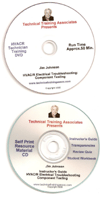Using a virtual workspace, Interplay Learning’s newly updated HVAC training program allows users to practice the tricks of the heating and cooling trades from the comforts of a controlled space. Similar to a flight simulation program, the virtual reality software helps users gain more experience in a shorter amount of time without the limitations of setup and equipment costs. (Watch a walkthrough of Interplay Learning's HVAC training software)
“The trades have always focused, potentially too much on hands-on only, believing that is the only way to learn,” says Craig Carter, Interplay’s business development manager. “Don’t get us wrong. We agree that hands-on training is important, but hand-son training faces many real-world limitations.”
How did you go about developing Interplay Learning’s HVAC training software's as a tool for real-world training?
We believe that when people have the right tools to practice their craft on their own time, wherever they want, as often as they want, that really incredible things are possible. We also believe that immersive, interactive, field-like learning is the most effective way to practice your craft outside of the field itself. Our software simply makes all of this possible.
What makes us unique is our approach to simulation-based learning and our specialty in skilled trades instructional design. Some examples of these limitations would be in-person time and setup costs, along with space limitations. You don’t experience these limitations with software simulations. Our focus is on supplementing on-the-job and traditional training, with the additional practice that provides field-like experience in a much shorter period of time in a safer environment. We compare it often to how pilots will use both flight time in a plane as well as we flight time in a simulator to get the needed expertise to become highly qualified.
Is the HVAC training program solely simulation-based?
In addition to our simulation-based learning, we are integrating on-demand, video-based training courses that deliver the applied science fundamentals to help technicians gain the necessary building blocks to becoming good techs. Our growing repository of courses are focused on the fundamentals but will quickly be advancing to help support all techs as they grow and advance in their career.
How do you make sure the software is teaching the relevant skills technicians need? Does Interplay employ HVAC technicians?
Interplay is a company filled with software engineers, game developers, instructional designers, and certainly skilled trades experts. These subject matter experts are vital to us delivering an effective product to our learners. In almost all cases, our experts not only have years of experience in the field but teaching as well. The fact that our experts have education and technical experience means they are always thinking about our learner's needs and what will make them more effective in the field sooner. We combine our expert's knowledge and teaching experience with our instructional designer's expertise to make sure our courses are built in such a way that we maximize the effectiveness of our online and on-demand courses.
About how many HVAC schools and installation companies currently use Interplay's HVAC training software?
The latest version of our HVAC Training Program just launched and is focused on helping companies in the HVAC industry easily build training programs to empower their techs to be better at their jobs. Our latest product has already been sold into large national HVAC firms, big regional companies as well as into small local shops. In addition to our latest launch, we have been supporting companies for years with our prior training products to improve their techs.
How do you see the progression of virtual reality in the skilled trades five years from now?
We know virtual reality will change trades training because it actually allows contractors to bring so much interactive training in-house. Companies only need to commit 10 feet of space and a relatively small technology investment and managers can provide field-like equipment for their team to learn on. From greener techs learning the basics to more advanced techs getting their first-hand experience on newer technology, the learning opportunities will continue to increase and we believe employee productivity and retention will follow.
We also believe that virtual reality has an opportunity to support one of the trades biggest needs over the next five years: people. Attracting engaged, excited young entrants to the trades is critical to the growing manpower deficit across the trade. Virtual reality training not only has an opportunity to deliver greater access to training for these new entrants, but it also sends a clear signal that the trades will provide a technology-centric approach to their careers. Do not get us wrong, we know that VR will not create the hard work and commitment needed to become a tradesman. But it does signal that this career is built for the future and potential workers are joining an industry on the cutting edge.











